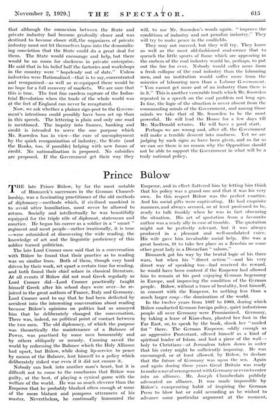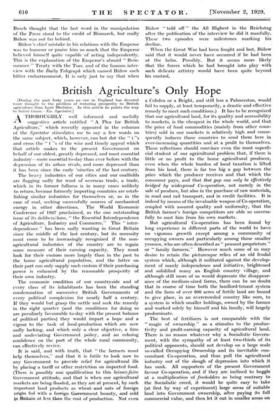Prince Biilow
/THE late Prince Billow, by far the most notable of Bismarck's successors in the German Chancel- lorship, was a fascinating practitioner of the old methods of diplomacy—methods which, if civilized mankind is to avoid utter humiliation, must never be allowed to return. Socially and intellectually he was beautifully equipped for the triple role of diplomat, statesman and courtier. He began his career as a soldier in a " smart " regiment and most people—rather irrationally, it is true —were astonished at discovering the wide reading, the knowledge of art and the linguistic proficiency of this soldier turned politician.
The late Lord Cromer once said that in a conversation with Billow he found that their practice as to reading was on similar lines. Both of them, though very hard driven by their work, set apart a certain time for reading, and- both found their chief solace in classical literature. At all events if Billow did not read Greek regularly as Lord Cromer did—Lord Cromer practically taught himself Greek after his school days were over—he re- joiced in the great authors of France, Italy and Germany. Lord Cromer used to say that he had been deflected by accident into the interesting conversation about reading because Billow's opinions on politics had so annoyed him that he deliberately changed the conversation. There was, indeed, no political point of contact between the two men. The old diplomacy, of which the purpose was theoretically the maintenance of a Balance of Power, was practised by some men honourably and by others obliquely or meanly. Canning saved the world by redressing the Balance which the Holy Alliance had upset, but Billow, while doing lip-service to peace by means of the Balance, lent himself to a policy which deliberately risked war even if it did not ensure it.
Nobody can look into another man's heart, but it is difficult not to come to the conclusion that Billow was guilty, at the best, of playing a cynical game with the welfare of the world. He was so much cleverer than the Emperor that he probably blushed often enough at some of the more blatant and pompous utterances of his master. Nevertheless, he continually humoured the Emperor, andin effect flattered him by letting him think that his policy was a grand. one and that it was his very own. In this respect Billow was the perfect courtier. And his social gifts were captivating. He had exquisite manners, and always seemed, or at least professed to be, ready to talk frankly when he was in fact obscuring the situation. His art of quotation from a favourite author was a ready ally in case of trouble. The quotation might not be perfectly relevant, but it was always produced in a pleasant and well-modulated voice. His wife gave him invaluable social help. She was a great hostess, fit to take her place as a Zcnobia or sonic other great lady in a Disraelian " saloon."
Bismarck got his way by the brutal logic of his three wars, but when his "direct action "—and his very direct way of speaking too—had received its reward, he would have been content if the Emperor had allowed him to remain at his post enjoying German hegemony in Europe, and improving the condition of the German people. Billow, without a trace of brutality, lent himself, in consort with the Emperor, to nothing less than a much larger coup—the domination of the world.
In the twelve years from 1897 to 1909, during which Billow conducted German foreign policy, quiet industrious people all over Germany were Prussianized. Germany, by taking a lease of Kiao-chau, planted her foot in the Far East, or, to speak by the book, shook her "mailed fist" there. The German Emperor, oddly enough as an aggressive Protestant, offered himself as a kind of spiritual leader of Islam, and had a piece of the wall—. holy to Christians—at Jerusalem taken down in order that his entry might be sufficiently imposing. He was encouraged, or at least allowed, by Billow, to declare that the future of Germany was upon the sea. Again and again during these years Great Britain was ready to make a naval arrangement with Germany or even to enter into an alliance. Mr. Joseph Chamberlain publicly advocated an alliance. It was made impossible by Billow's exasperating habit of inspiring the German Press to blow hot or cold according as he wished to advance some particular argument at the moment, Busch thought that the last word in the manipulation of the Press stood to the credit of Bismarck, but really Billow was not far behind.
Billow's chief mistake in his relations with the Emperor was to humour or praise him so much that the Emperor believed himself quite capable of acting independently. This is the explanation of the Emperor's absurd " Rein- surance " Treaty with the Tsar, and of the famous inter- view with the Daily Telegraph which caused Billow such bitter embarrassment. It is only just to Say that when Billow "told off" the All Highest in the Reichstag after the publication of the interview he did it manfully. These two episodes were milestones marking his decline. - • When the Great War had been fought and lost, Billow said that it would never have occurred if he had been at the helm. Possibly. But it' seems more likely that the forces which he had brought into play with such delicate artistry would have been quite beyond his control.









































 Previous page
Previous page